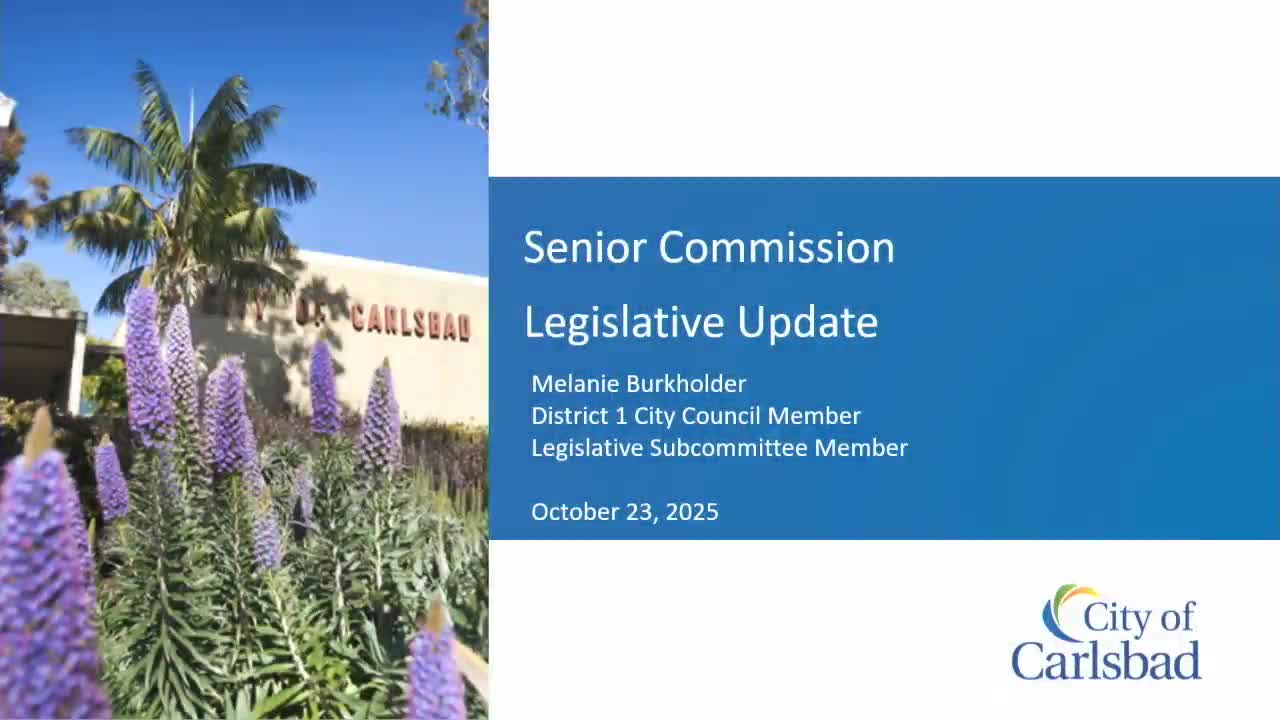Carlsbad legislative subcommittee outlines advocacy work, cites opposition to SB 79
Get AI-powered insights, summaries, and transcripts
Subscribe
Summary
City intergovernmental affairs director Jason Haber and Councilmember Melanie Burkholder briefed the Senior Commission on the city’s legislative program, describing the legislative platform, lobbyist relationships, recent bill sponsorships and the city’s opposition to SB 79. They also discussed grant-seeking and federal funding priorities.
Jason Haber, the City of Carlsbad’s intergovernmental affairs director, and Councilmember Melanie Burkholder briefed the Senior Commission on Oct. 23, 2025 about the city’s legislative program, how the city decides when to support or oppose state and federal bills, and recent advocacy efforts including opposition to SB 79.
The presentation explained that the city’s intergovernmental affairs program is guided by City Council Policy 39 and a council resolution that established a standing legislative subcommittee. “It’s come to our attention that some commissioners don't actually know that we have a subcommittee, and if you do, you don't know what we do,” Burkholder said. The subcommittee, currently made up of Councilmember Burkholder and Councilmember Acosta, meets monthly and works with state and federal lobbyists, staff and regional partners on pending legislation and funding requests.
Haber said the city maintains a legislative platform—position statements the council already adopted—so staff and lobbyists can act quickly on bills that affect Carlsbad. “When legislation comes before us, we can choose to watch it, support it, or oppose it,” Haber said. He described regular coordination with department staff (for example, parks and recreation) and with contracted lobbyists in Sacramento and Washington, D.C., and noted the city also uses a grant writer to identify state and federal funding opportunities.
Speakers described bill sponsorship work the city has undertaken since 2022. The presenters said the city has had five sponsored bills become law since 2022, including measures related to lifeguarding certification and rescue approaches at sea that required state law changes. The presenters identified AB 1682 (referenced in the presentation in connection with lifeguarding rules) and said the city continues to develop new bill ideas, including proposals related to sober living homes and short-term rentals in ADUs and density bonus projects.
Burkholder and Haber discussed SB 79, a state bill that the presenters said would have increased height and density near transit and delegated land-use authority to transit districts in some cases. The presenters said they opposed SB 79 and that their area legislators ultimately voted in opposition. Burkholder described the city’s concern about unfunded mandates and about infrastructure that must support additional density: “It’s basically a ministerial approval of anything that is near transit, and it’s really bad for the things that keep me up at night, which is what’s under our feet right now,” she said, referring to infrastructure needs such as water and sewer systems.
The presentation also reviewed the city’s funding-priority process. Staff described how the subcommittee and council identify priority projects for discretionary and competitive funding—examples included ADA beach access improvements and a regional rail-trenching project for which the presenters said the city has sought federal and regional funds. Haber said the city received a $1 million allocation in a House appropriations committee bill related to a trenching project; that allocation, he said, remains stalled in the federal appropriations process.
Why it matters: the subcommittee presentation lays out the city’s approach to state and federal advocacy, including how staff, the council and contracted lobbyists select bills to support or oppose, when the city will sponsor legislation, and how it packages funding requests for state and federal partners. Commission members were encouraged to forward legislative or regulatory proposals that affect seniors to staff so the subcommittee can consider them.
The presenters invited questions from the commission and closed by asking commissioners to alert staff to proposals that affect seniors so the subcommittee can review them.
